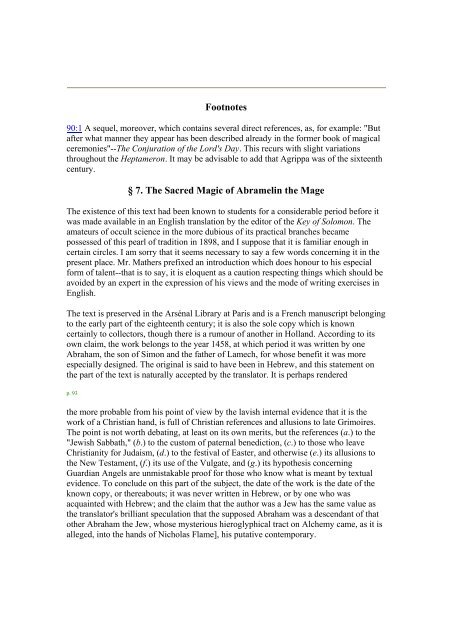the book of ceremonial magic contents - Yankeeclassic.com
the book of ceremonial magic contents - Yankeeclassic.com
the book of ceremonial magic contents - Yankeeclassic.com
Create successful ePaper yourself
Turn your PDF publications into a flip-book with our unique Google optimized e-Paper software.
Footnotes<br />
90:1 A sequel, moreover, which contains several direct references, as, for example: "But<br />
after what manner <strong>the</strong>y appear has been described already in <strong>the</strong> former <strong>book</strong> <strong>of</strong> <strong>magic</strong>al<br />
ceremonies"--The Conjuration <strong>of</strong> <strong>the</strong> Lord's Day. This recurs with slight variations<br />
throughout <strong>the</strong> Heptameron. It may be advisable to add that Agrippa was <strong>of</strong> <strong>the</strong> sixteenth<br />
century.<br />
§ 7. The Sacred Magic <strong>of</strong> Abramelin <strong>the</strong> Mage<br />
The existence <strong>of</strong> this text had been known to students for a considerable period before it<br />
was made available in an English translation by <strong>the</strong> editor <strong>of</strong> <strong>the</strong> Key <strong>of</strong> Solomon. The<br />
amateurs <strong>of</strong> occult science in <strong>the</strong> more dubious <strong>of</strong> its practical branches became<br />
possessed <strong>of</strong> this pearl <strong>of</strong> tradition in 1898, and I suppose that it is familiar enough in<br />
certain circles. I am sorry that it seems necessary to say a few words concerning it in <strong>the</strong><br />
present place. Mr. Ma<strong>the</strong>rs prefixed an introduction which does honour to his especial<br />
form <strong>of</strong> talent--that is to say, it is eloquent as a caution respecting things which should be<br />
avoided by an expert in <strong>the</strong> expression <strong>of</strong> his views and <strong>the</strong> mode <strong>of</strong> writing exercises in<br />
English.<br />
The text is preserved in <strong>the</strong> Arsénal Library at Paris and is a French manuscript belonging<br />
to <strong>the</strong> early part <strong>of</strong> <strong>the</strong> eighteenth century; it is also <strong>the</strong> sole copy which is known<br />
certainly to collectors, though <strong>the</strong>re is a rumour <strong>of</strong> ano<strong>the</strong>r in Holland. According to its<br />
own claim, <strong>the</strong> work belongs to <strong>the</strong> year 1458, at which period it was written by one<br />
Abraham, <strong>the</strong> son <strong>of</strong> Simon and <strong>the</strong> fa<strong>the</strong>r <strong>of</strong> Lamech, for whose benefit it was more<br />
especially designed. The original is said to have been in Hebrew, and this statement on<br />
<strong>the</strong> part <strong>of</strong> <strong>the</strong> text is naturally accepted by <strong>the</strong> translator. It is perhaps rendered<br />
p. 93<br />
<strong>the</strong> more probable from his point <strong>of</strong> view by <strong>the</strong> lavish internal evidence that it is <strong>the</strong><br />
work <strong>of</strong> a Christian hand, is full <strong>of</strong> Christian references and allusions to late Grimoires.<br />
The point is not worth debating, at least on its own merits, but <strong>the</strong> references (a.) to <strong>the</strong><br />
"Jewish Sabbath," (b.) to <strong>the</strong> custom <strong>of</strong> paternal benediction, (c.) to those who leave<br />
Christianity for Judaism, (d.) to <strong>the</strong> festival <strong>of</strong> Easter, and o<strong>the</strong>rwise (e.) its allusions to<br />
<strong>the</strong> New Testament, (f.) its use <strong>of</strong> <strong>the</strong> Vulgate, and (g.) its hypo<strong>the</strong>sis concerning<br />
Guardian Angels are unmistakable pro<strong>of</strong> for those who know what is meant by textual<br />
evidence. To conclude on this part <strong>of</strong> <strong>the</strong> subject, <strong>the</strong> date <strong>of</strong> <strong>the</strong> work is <strong>the</strong> date <strong>of</strong> <strong>the</strong><br />
known copy, or <strong>the</strong>reabouts; it was never written in Hebrew, or by one who was<br />
acquainted with Hebrew; and <strong>the</strong> claim that <strong>the</strong> author was a Jew has <strong>the</strong> same value as<br />
<strong>the</strong> translator's brilliant speculation that <strong>the</strong> supposed Abraham was a descendant <strong>of</strong> that<br />
o<strong>the</strong>r Abraham <strong>the</strong> Jew, whose mysterious hieroglyphical tract on Alchemy came, as it is<br />
alleged, into <strong>the</strong> hands <strong>of</strong> Nicholas Flame], his putative contemporary.


